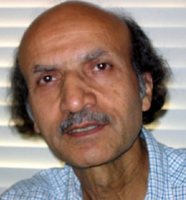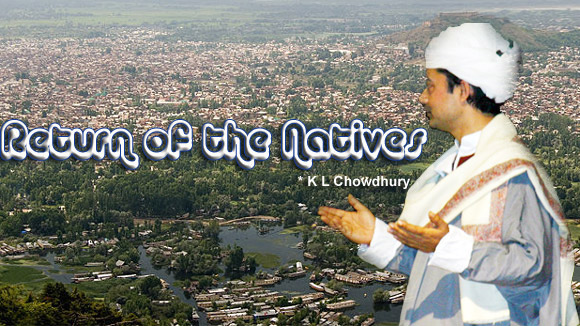Return of the Natives
|
|
|
In search for a roof over his head he used many stopovers over several years, till he finally landed in Purkhoo “Migrant’ Camp and earned his claim to a one-room ‘quarter’ in Purkhoo Phase III, constructed for Kashmiri ‘migrants’. He was allotted Room 555 where he has been living for nearly a decade. Come March 2008 and Prithvinath decided that he had waited enough to return to his native land. He weighed the pros and cons with his wife and children. There was nothing to go by except his judgment. That is how Kashmiri Pandits like it - their own assessment of a situation rather than the conflicting opinions of their leaders or the shifting claims and hollow promises of the powers-that-be regarding their return to The couple boarded the Jammu-Srinagar bus, alighted at Anantnag and took another bus straight to Kulgam and to their village. Dusk had fallen. The village wore a different look from what they remembered – many new constructions, a paved road and wider alleys. They walked to their house from the village bus stop and found a ruin in its place. Other Pandit houses close by stood out like ghosts for they were either burnt down or in utter disrepair. There was no question any of these houses could be renovated to make them habitable again. He realized that he would need to rebuild his home if the ever decided to settle back in his ancestral village. While Prithvinath and his wife were looking misty-eyed at, what remained of, their orchard, a small crowd of teens gathered around them. It was the first time they found total strangers in the village. The couple looked out of the ordinary, out of place, and outlandishly dressed – a man with a boat like cap they had never seen before, a long tweed waistcoat with full sleeves and pajamas with straight legs and not the shalwar type that Muslims wear, and a woman in a short blouse and a baggy sari that she wore around her legs, from where it crossed her torso and slung over a shoulder to cover her head, and back to the front of the body - looking lost in front of the ghost houses, they had been told, belonged to the Battas who had left the village en masse. Could they be the owners of one of them, could they be Battas, the boys wondered? “We are no strangers; we belong to this village. We used to live here many years ago. Most of you may not have been born then. Your parents will recognize us if they are around,” Prithvinath did not show the least perturbation while addressing the amused, inquisitive band. Meanwhile more village folk gathered and one of the elders, recognizing them, shouted aloud, “What do we see; is this our Prithvinath and his wife, Bhabi? Say, when did you arrive? You should have informed us in advance. Welcome back home. Where have you been all these years? Did you not even miss us? You have left a void and we have been talking everyday about you. It is incomplete without Battas here. Now don’t tell us you just came to look around. You must stay back, return here for good.” “But there is nothing left of our house. It has been vandalized, it is in shambles. We will have to start from a scratch again. Except for the walnuts there is not a tree left in our orchard. The apples have dried up, the poplars have been cut, and the almonds are all but gone. It is all barren. We had sweated for the orchard, you know. It will take years to cultivate it again. By that time even our ashes will have blown away,” Prithvinath remonstrated. Please do not worry. Inshaullah, everything will all fall back in place once you decide to stay and give it a try. So many have lost their lives in this therik, they certainly will not come back again but for those who survived there is hope. All that was destroyed can be rebuilt - homes, orchards, gardens – if there is life,” the elder pacified him. Meanwhile more elders gathered. There was a commotion, people embracing the returning natives - men hugging Prithvi Nath, shaking hands and not letting go the grip, women sobbing and shedding tears of reunion with his wife. There were spates of inquiries about their children and about other Pandits of the village - Ramjoo the postman, Radhakrishen the master, Nilakanth the draughtsman, Shibenkrishen the pharmacist and others. The Mukdam, Kh. Habibullah Ratheer, joined the crowd soon after. The members of the village Auqaf Committee that looks after the Muslim shrines, mosques, cemeteries and other religious estates unanimously agreed to take them in, make them comfortable and provide them an accommodation to start life all over again. A vacant house was provided rent-free, with modest furnishings - two beds and mattresses, a few durries and mats. The villagers offered to cook meals for them but since the Pandits preferred to cook their own meals, they were provided rice grain, vegetables, spices, salt, oil etc. along with the utensils and cooking paraphernalia. Thus Prithvinath and his wife began a new chapter of their life in the village. Two girls of a neighbor came every morning to sweep the house clean and dust it. People brought in fresh vegetable supplies from their own gardens every day. Others dropped in to inquire if the couple needed anything from the market or from the capital city. Since it was sowing time Prithvinath decided to plant new apple saplings in his barren land. He purchased 700 saplings which were provided at half the prevailing price of seventy rupees a piece. Farm hands helped him plant and water the saplings and to set up a vegetable patch. He enjoyed attending to his land, chatting with the people of his generation, recounting the horrendous tales of his life in exile, listening to the gory details of death and destruction that had overtaken the valley and the tragic stories of thousands of young boys who had been lured into militancy and had lost their lives or were still missing. He was shocked to find young widows and orphans. He could not decide who had suffered more – the Pandits who were uprooted and forced into exodus from their homes to suffer the travails of an exiled life, or the young Muslim militant boys who were beguiled into a self-destructive course or the general masses who were caught in wild crossfire. It was Kashmiris who suffered; it was Spring moved into summer and fall like a fairy tale. Prithvinath and his wife almost forgot the blistering heat and blinding dust of 18 Alas, the fall of 2008 also saw the whole State of Prithvinath’s children were deeply concerned about the safety of their parents in Prithvinath and his wife stayed put and never lost a wink of sleep in spite of the terrible upheaval. After the fires were quelled, they called their son and daughter along with two grandchildren who were received with aplomb by the villagers. It was yet another happy reunion. The youngsters were introduced to village youth. There was a good feeling all round. When time arrived for the visitors to return to “Come back for good and ask our other Pandit brethren as well. It feels empty without Battas. Prithvinath and his wife have come to Notes: Battas – Kashmiri Pandits Inshaullah – with God’s grace therik – militancy Mukdam - village head Chille Kalan and Chille Bacha- the months of severe winter in Phalgun- the month heralding spring |
|
|
 *Dr. K L Chowdhury retired as a Professor of Medicine, Medical College, Srinagar. Presently he is the Director of a charitable institution, Shriya Bhatt Mission Hospital and Research Center, Durga Nagar, Jammu. *Dr. K L Chowdhury retired as a Professor of Medicine, Medical College, Srinagar. Presently he is the Director of a charitable institution, Shriya Bhatt Mission Hospital and Research Center, Durga Nagar, Jammu. He is a physician and neurologist, a medical researcher, poet, social activist. He writes on diverse subjects – medical, literary, social and political and has numerous research papers to his credit, his pioneering work being “The Health Trauma in a Displaced Population” which was presented at national and international conferences. He has published three anthologies namely: 1- “Of Gods, Men and Militants”. Minerva Press (Pvt.) India -2000 2- “A Thousand-Petalled Garland and other Poems”. Writers Workshop Kolkata – 2003 3- “Enchanting world of Infants” Peacock Books, Atlantic Publishers and Distributors-2007 He was declared Shehjar's 'Kashmiri Person of the year' for 2007. |
|
|
| Copyrights © 2007 Shehjar online and KashmirGroup.com. Any content, including but not limited to text, software, music, sound, photographs, video, graphics or other material contained may not be modified, copied, reproduced, republished, uploaded, posted, or distributed in any form or context without written permission. Terms & Conditions. The views expressed are solely the author's and not necessarily the views of Shehjar or its owners. Content and posts from such authors are provided "AS IS", with no warranties, and confer no rights. The material and information provided iare for general information only and should not, in any respect, be relied on as professional advice. Neither Shehjar.kashmirgroup.com nor kashmirgroup.com represent or endorse the accuracy or reliability of any advice, opinion, statement, or other information displayed, uploaded, or distributed through the Service by any user, information provider or any other person or entity. You acknowledge that any reliance upon any such opinion, advice, statement, memorandum, or information shall be at your sole risk. |

